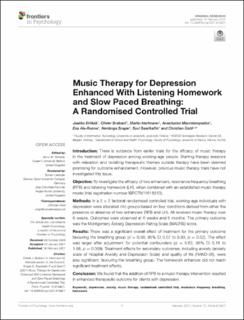| dc.contributor.author | Erkkilä, Jaakko | |
| dc.contributor.author | Brabant, Olivier | |
| dc.contributor.author | Hartmann, Martin | |
| dc.contributor.author | Mavrolampados, Anastasios | |
| dc.contributor.author | Ala-Ruona, Esa | |
| dc.contributor.author | Snape, Nerdinga | |
| dc.contributor.author | Saarikallio, Suvi | |
| dc.contributor.author | Gold, Christian | |
| dc.date.accessioned | 2021-09-05T15:27:50Z | |
| dc.date.available | 2021-09-05T15:27:50Z | |
| dc.date.created | 2021-08-06T13:56:46Z | |
| dc.date.issued | 2021 | |
| dc.identifier.citation | Frontiers in Psychology. 2021, 12 1-14. | en_US |
| dc.identifier.issn | 1664-1078 | |
| dc.identifier.uri | https://hdl.handle.net/11250/2773603 | |
| dc.description.abstract | Introduction: There is evidence from earlier trials for the efficacy of music therapy in the treatment of depression among working-age people. Starting therapy sessions with relaxation and revisiting therapeutic themes outside therapy have been deemed promising for outcome enhancement. However, previous music therapy trials have not investigated this issue.
Objective: To investigate the efficacy of two enhancers, resonance frequency breathing (RFB) and listening homework (LH), when combined with an established music therapy model (trial registration number ISRCTN11618310).
Methods: In a 2 × 2 factorial randomised controlled trial, working-age individuals with depression were allocated into groups based on four conditions derived from either the presence or absence of two enhancers (RFB and LH). All received music therapy over 6 weeks. Outcomes were observed at 6 weeks and 6 months. The primary outcome was the Montgomery Åsberg Depression Rating Scale (MADRS) score.
Results: There was a significant overall effect of treatment for the primary outcome favouring the breathing group (d = 0.50, 95% CI 0.07 to 0.93, p = 0.02). The effect was larger after adjustment for potential confounders (d = 0.62, 95% CI 0.16 to 1.08, p = 0.009). Treatment effects for secondary outcomes, including anxiety (anxiety scale of Hospital Anxiety and Depression Scale) and quality of life (RAND-36), were also significant, favouring the breathing group. The homework enhancer did not reach significant treatment effects.
Conclusion: We found that the addition of RFB to a music therapy intervention resulted in enhanced therapeutic outcome for clients with depression. | en_US |
| dc.language.iso | eng | en_US |
| dc.rights | Navngivelse 4.0 Internasjonal | * |
| dc.rights.uri | http://creativecommons.org/licenses/by/4.0/deed.no | * |
| dc.title | Music Therapy for Depression Enhanced With Listening Homework and Slow Paced Breathing: A Randomised Controlled Trial | en_US |
| dc.type | Journal article | en_US |
| dc.type | Peer reviewed | en_US |
| dc.rights.holder | Copyright © 2021 Erkkilä, Brabant, Hartmann, Mavrolampados, Ala-Ruona, Snape, Saarikallio and Gold | |
| dc.description.version | publishedVersion | en_US |
| cristin.ispublished | true | |
| cristin.fulltext | original | |
| cristin.qualitycode | 1 | |
| dc.identifier.doi | 10.3389/fpsyg.2021.613821 | |
| dc.identifier.cristin | 1924408 | |
| dc.source.journal | Frontiers in Psychology | en_US |
| dc.source.volume | 12 | en_US |
| dc.source.pagenumber | 1-14 | en_US |

